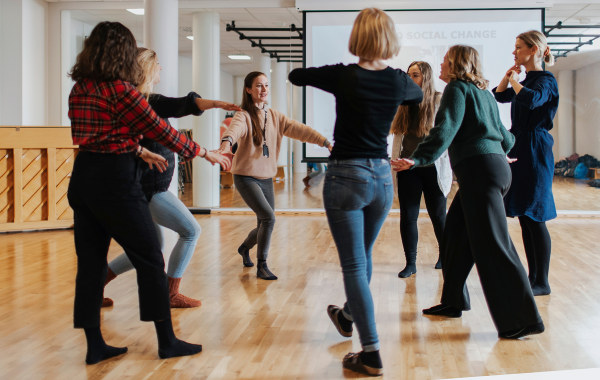Education - Arts Education - Masters - 2 years - Trondheim
Education – Arts Education
Education – Arts Education
Picture mdidkunstfag

Read more
Read more about the programme on the Norwegian website
About the study programme
The Master of Arts Education is an innovative and multidisciplinary programme that explores the opportunities and challenges of the arts in contemporary education. Arts education focuses on teaching and learning in and through the arts in a variety of contexts and in relation to global discourses and theories. The programme provides rigorous research and development expertise in Arts Education at Master's degree level.
In the Master of Arts Education programme, you will critically examine practices, theories, and issues that you find personally and professionally challenging and stimulating. Along with advanced specialist knowledge of arts education you will gain intellectual and life skills that will equip you for employment, global citizenship, and community involvement.
The program is relevant to those with backgrounds in an art subjects, such as:
- music
- dance
- drama / theater
- arts / crafts
- visual art
- literature
- film / media
- or for those with an aesthetic background as a school teacher or kindergarten teacher
The study is relevant for teachers, and preschool teachers / kindergarten teachers who do not hold a Master's degree, and also relevant for artists and students who do not have teacher education.
About Arts Education
Arts education research fosters independent examination of creative practice, pedagogy, history, people, and society. This Master's programme gives you the opportunity to strengthen and develop your creative and critical practices as a researcher, teacher, and artist. The program qualifies you for teaching and teaching-related work in schools, cultural schools, higher education, and industry contexts, as well as in areas of policy development, research, management, and administration.
Teaching methods and programme structure
This Master's programme is based on student-active forms. The programme has varied forms of teaching, student activities, and assessment. In addition to teaching and guidance from academic staff, there are also independent and peer activities. The teaching and learning methods weave practice and theory together, with critical questioning and reflection being fostered throughout the working processes.
The study has a clear link to artistic practice. Several of the assignments in the compulsory subjects are linked to practice arenas.
In the Master of Arts Education you learn about:
- research in and with the arts, including and emphasising arts-based, practice-led research as well as theory-driven, critical and decolonial research
- arts as social change in theory and practice
- key ideas behind the theories and methods in arts education research, and how to thoroughly apply these independently in research, practice, and writing
- structural tools and understandings within the arts (in the realms of dramaturgy, choreography, composition, and visual design), and how such tools and understandings can be utilised in teaching and research
- how to engage creatively with different groups of people in different educational and cultural contexts
- research ethical guidelines and to think ethically as a researcher in the arts
- academic writing, thinking and reasoning
- to plan and write a Master's thesis in the form of an independent research and development work under supervision
Master of Arts Education with a creative practice component
The Master of Arts Education can be completed through a thesis that combines practice and theory.
A Master of Arts Education with a creative practice component recognises a creative arts output as a contribution towards advancing knowledge in a particular field. Integrated alongside a written thesis, you can present an exhibition, design or performance as examinable work towards your qualification. Creative components can be presented as part of your printed thesis, as a digital recording, or as a live performance or exhibition. It is expected that the theoretical and practical components of the thesis will be related throughout the research process and in the final presentation.
studyprogramme-facts-portlet
- Programcode: MDID
- Study programme: Education - Master's Programme
- Duration: Full-time
- Credits: 120
- Unit: Department of Teacher Education
- Apply before: 15. april
- Language of instruction: Norwegian
- Location: Trondheim
